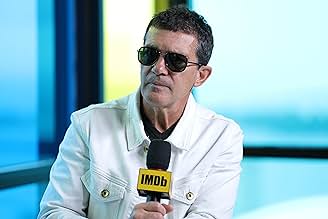A film director reflects on the choices he's made in life as the past and present come crashing down around him.A film director reflects on the choices he's made in life as the past and present come crashing down around him.A film director reflects on the choices he's made in life as the past and present come crashing down around him.
- Nominated for 2 Oscars
- 72 wins & 185 nominations total
- Director
- Writer
- All cast & crew
- Production, box office & more at IMDbPro
Featured reviews
The story about the artistic crisis and depression. Once the noise of the glory goes away, there's nothing but emptiness and pain inside.
Almodóvar has created this autobiographical masterpiece during his darkest and the most lonely moments in his life. It's different from everything that the genius had shared with the world before.
Feeling of loneliness and pain in every scene, that makes a glory so unimportant and empty, when you have no one to share it with. The director made the audience hold the breath while he was speaking and sharing his most intimate secrets, his memories and regrets about the past.
Endless respect for Almodóvar for making this autobiographical movie so personal and sincere.
Endless respect for Almodóvar for making this autobiographical movie so personal and sincere.
As Salvador (exquisitely played by Antonio Banderas) says in the movie "A great actor is not the one who cries, but the one who knows how to contain the tears" and I think that describes the movie perfectly, you feel the pain in every scene but never get the chance to let that emotion overcome, it's a beautiful and raw portrayal of life in a way we've never seen Almodóvar do before, the film breathes a diaphanous simplicity and spontaneity, far from what we're used to see from the filmmaker. Every aspect of this movie felt very personal and intimate, almost like reading someone's diary while it's being written or someone sharing a part of their soul, i'm sure this movie wasn't easy to make.
This is a story about pain, sadness, solitude, self discovery, forgiveness and regret but most of all, it's a movie about overcoming and I honestly feel this is one of his best works in recent years.
This is a story about pain, sadness, solitude, self discovery, forgiveness and regret but most of all, it's a movie about overcoming and I honestly feel this is one of his best works in recent years.
(Antonio Banderas won Best Actor award at the Cannes festival because he played Almodóvar).
I know there are tons of autobiographical films about a painful past and unfinished business (in Hollywood), but Almodóvar reflects his own past very well.
Almodóvar's "Pain and Glory" is very beautifully shot and well-described autobiographical film about emptiness, recollection of the past and most importantly, about salvation. The film also describes well pain, sadness, self discovery, forgiveness, regret, all these feelings that the director is going through.
Without spoiling anything, the story is about a known Spanish director, Salvador Mallo, who reflects his choices made in his life (from his childhood to his cinema career) as past and present come crashing around him.
Almodóvar wanted to represent his life and memories from his life, bathred boundless desire to live and love that guide us to forgiveness with oneself and others. He's entering the stage where he's no longer have inspiration, but he uses his life as a cinema fiction. Almodóvar reflects mostly to his past as something painful and unfinished. Only with the return of ourselves, with coping with the painful past, we have the possibility to rehabilitate ourselves. As I mentioned, Antonio gives a great performance as a reconstructed fella with a passion.
I think whoever watched Almodóvar's previous pieces would enjoy from his new personal film about a person's valuable soul.
I know there are tons of autobiographical films about a painful past and unfinished business (in Hollywood), but Almodóvar reflects his own past very well.
Almodóvar's "Pain and Glory" is very beautifully shot and well-described autobiographical film about emptiness, recollection of the past and most importantly, about salvation. The film also describes well pain, sadness, self discovery, forgiveness, regret, all these feelings that the director is going through.
Without spoiling anything, the story is about a known Spanish director, Salvador Mallo, who reflects his choices made in his life (from his childhood to his cinema career) as past and present come crashing around him.
Almodóvar wanted to represent his life and memories from his life, bathred boundless desire to live and love that guide us to forgiveness with oneself and others. He's entering the stage where he's no longer have inspiration, but he uses his life as a cinema fiction. Almodóvar reflects mostly to his past as something painful and unfinished. Only with the return of ourselves, with coping with the painful past, we have the possibility to rehabilitate ourselves. As I mentioned, Antonio gives a great performance as a reconstructed fella with a passion.
I think whoever watched Almodóvar's previous pieces would enjoy from his new personal film about a person's valuable soul.
I. Short review:
Half autobiographic, half fiction, Almodóvar's most intimate work is an european drama carved with humor and intense emotions you wouldn't want to miss, Antonio Banderas is a tour de force.
II. Full review:
Since this year's Cannes Film Festival celebration in which Pain and Glory competed for the Palm d'Or for best picture and supposedly the favorite to win, I took quite interest in Almodóvar's new film, also my personal experiences with two of his films that I've seen, 'Talk to Her' (which I think is an absolute masterpiece), and the very creative thriller 'The Skin I Live In' (also starring Antonio Banderas), were strong factors of that interest.
The film tells the story of a depressed and aching director that reconnects with old friends and people he used to care about, at the time that he reflects on his humble but enlightning past in several ways, all from the perspective of his gloomy and lonesome present.
Pain and Glory escalates in a ladder of triumphs, since its mesmerizing soundtrack by Alberto Iglesias (Tinker Tailor Soldier Spy), an astonishing cinematography by José Luis Alcaine, a masterful direction and gripping script by Pedro Almodóvar, to its top and greatest gift of all: a colossal performance by Antonio Banderas, which justifies his award for best actor in Cannes 2019.
Half autobiographic, half fiction, Almodóvar's most intimate work is an european drama carved with humor and intense emotions you wouldn't want to miss, Antonio Banderas is a tour de force.
II. Full review:
Since this year's Cannes Film Festival celebration in which Pain and Glory competed for the Palm d'Or for best picture and supposedly the favorite to win, I took quite interest in Almodóvar's new film, also my personal experiences with two of his films that I've seen, 'Talk to Her' (which I think is an absolute masterpiece), and the very creative thriller 'The Skin I Live In' (also starring Antonio Banderas), were strong factors of that interest.
The film tells the story of a depressed and aching director that reconnects with old friends and people he used to care about, at the time that he reflects on his humble but enlightning past in several ways, all from the perspective of his gloomy and lonesome present.
Pain and Glory escalates in a ladder of triumphs, since its mesmerizing soundtrack by Alberto Iglesias (Tinker Tailor Soldier Spy), an astonishing cinematography by José Luis Alcaine, a masterful direction and gripping script by Pedro Almodóvar, to its top and greatest gift of all: a colossal performance by Antonio Banderas, which justifies his award for best actor in Cannes 2019.
A filmmaker (Antonio Banderas) deals with physical and mental ailments as he approaches old age, settling in to a sad kind of torpor as he reflects on life. People have come and gone and the real pain here seems to be quiet melancholy of regret, his body's (significant) issues notwithstanding. The film meanders a bit and suffers at times with pacing, but through his reflections and flashbacks, it tells a touching story about coming to peace with those we've known in life.
There's the filmmaker's mother (Penélope Cruz), who sent him to a seminary for most of his schooling because she had no money for a secular education, which led to him not learning much. In old age she dies alone in a hospital instead of in her home village, where he had promised to take her. (Oddly, the actor playing the elderly mother, Julieta Serrano, has blue eyes whereas Cruz's are brown, which was a little jarring to me). These are the things that swirl around in his mind as he still grieves over losing her.
There is also the actor from one of his popular films (Asier Etxeandia), who he had a falling out with decades ago, but who he reconnects with and is then introduced to heroin by. He casually tries it and then alarmingly we see him quickly hooked, which makes for what seemed like one of the longer subplots, which I wasn't all that interested in. There is an old lover who surfaces (Leonardo Sbaraglia), a man who disappeared out of his life and is now married with children, and the scene the two share is full of authenticity and warmth. He also recalls a time in childhood when he tutored a handyman for payment of services to his mother, and felt the first flush of desire when he saw him bathing.
I think Almodóvar was wise to draw a line at this last character not physically meeting him decades later, as it gave the film realism and a wistful bit of sentimentality. True to form, he also gives the viewer an explosion of primary colors, and there is certainly a lot of beauty on the screen. That kitchen, especially with its bold red cabinets, made me wonder if such a space would be too loud to live in, but later I read that it was modeled on Almodóvar's own home. I also loved the little touch of the Cruz's character and her friends breaking in to a light song while washing their clothes in the river. Nothing "big" happens here, but in its quiet way, it reflects the director, and his pain and glory in life.
There's the filmmaker's mother (Penélope Cruz), who sent him to a seminary for most of his schooling because she had no money for a secular education, which led to him not learning much. In old age she dies alone in a hospital instead of in her home village, where he had promised to take her. (Oddly, the actor playing the elderly mother, Julieta Serrano, has blue eyes whereas Cruz's are brown, which was a little jarring to me). These are the things that swirl around in his mind as he still grieves over losing her.
There is also the actor from one of his popular films (Asier Etxeandia), who he had a falling out with decades ago, but who he reconnects with and is then introduced to heroin by. He casually tries it and then alarmingly we see him quickly hooked, which makes for what seemed like one of the longer subplots, which I wasn't all that interested in. There is an old lover who surfaces (Leonardo Sbaraglia), a man who disappeared out of his life and is now married with children, and the scene the two share is full of authenticity and warmth. He also recalls a time in childhood when he tutored a handyman for payment of services to his mother, and felt the first flush of desire when he saw him bathing.
I think Almodóvar was wise to draw a line at this last character not physically meeting him decades later, as it gave the film realism and a wistful bit of sentimentality. True to form, he also gives the viewer an explosion of primary colors, and there is certainly a lot of beauty on the screen. That kitchen, especially with its bold red cabinets, made me wonder if such a space would be too loud to live in, but later I read that it was modeled on Almodóvar's own home. I also loved the little touch of the Cruz's character and her friends breaking in to a light song while washing their clothes in the river. Nothing "big" happens here, but in its quiet way, it reflects the director, and his pain and glory in life.
Did you know
- TriviaJulieta Serrano and Antonio Banderas already played mother and son, more than 30 years before, in another two movies by Pedro Almodóvar: Femmes au bord de la crise de nerfs (1988) and Matador (1986)
- GoofsThe eye color of Penelope Cruz (Antonio's young mother) are brown while the old mother's are pale blue. In the very last scene of the film, it appears that Penelope Cruz is an actress who plays Antonio Banderas's young mother while filming a scene in front of him.
- Quotes
Salvador Mallo: The nights that coincide several pains, those nights I believe in God and I pray to him. The days when I only suffer a type of pain I'm an atheist.
- ConnectionsFeatured in 2020 Golden Globe Awards (2020)
- SoundtracksA tu vera
Written by Juan Solano (as Juan Solano Pedrero) and Rafael de León (as Rafael de Leon Arias de Saavedra)
Performed by Rosalía and Penélope Cruz
- How long is Pain and Glory?Powered by Alexa
Details
- Release date
- Countries of origin
- Official sites
- Language
- Also known as
- Pain and Glory
- Filming locations
- Paterna, Valencia, Comunidad Valenciana, Spain(underground dwelling)
- Production companies
- See more company credits at IMDbPro
Box office
- Gross US & Canada
- $4,567,338
- Opening weekend US & Canada
- $152,636
- Oct 6, 2019
- Gross worldwide
- $37,359,689
- Runtime1 hour 53 minutes
- Color
- Sound mix
- Aspect ratio
- 1.85 : 1
Contribute to this page
Suggest an edit or add missing content



![Tráiler 2 [OV]](https://m.media-amazon.com/images/M/MV5BYWViMTBkNDgtOGM3Yi00YmFhLTk2OTItYWY5ZDJlODg0NGY4XkEyXkFqcGdeQXRyYW5zY29kZS13b3JrZmxvdw@@._V1_QL75_UX500_CR0)
![Tráiler [OV]](https://m.media-amazon.com/images/M/MV5BOGQ1YmRmNjUtMjVmYy00NDAxLThhNmEtMGNjNTIzZmQ2ZTcxXkEyXkFqcGdeQXRyYW5zY29kZS13b3JrZmxvdw@@._V1_QL75_UX500_CR0)





































